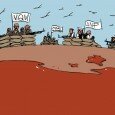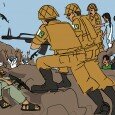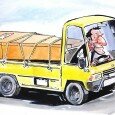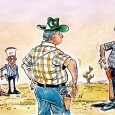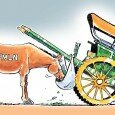The slow but steady dissolution of civilian authority
Institutions last, people do not. The damage done to Nawaz Sharif or Imran Khan’s political careers during this, the longest march, may be irreparable (it concerns few people but them), but the damage inflicted upon civilian state institutions is unforgiveable, and not so easily repaired either.
Imran Khan and Tahir-ul-Qadri’s protests marched into the capital hurling condemnations and stones at the seat of civilian power. The former is an elected member of parliament and sworn to uphold both the constitution of Pakistan and the integrity of elected assemblies. Tahir-ul-Qadri is sworn only to his own crusade, but if he believes his own rhetoric of making Pakistan a strong, democratic, self-respecting civilian state, then he must know that he has been exerting great effort to make it the exact opposite.
As civil-military relations readjusted themselves in the backdrop of the two sit-ins that held Islamabad hostage for the past month, it was unclear who had won, but it was abundantly clear who had lost, the fledgling institutions of civilian statehood in Pakistan.
Democracy isn’t a solution, it’s not perfect, it doesn’t herald economic prosperity in and of itself. Democracy is a principle, the right to self-determination. Likewise, the parliament isn’t a forum to settle personal scores, whether shouting from inside or out. The parliament is a symbol of the autonomy and writ of the democratic state.
Problems with Pakistan’s democracy, and yes there are many, stem from a lack of continuity, from interruptions and resets. We have often blamed the military for being the cause of these interruptions, and rightfully so, but on certain occasions it’s the civilian leaders themselves, the ones who stand to lose the most from derailing the system, that deliver these fatal blows.
When Imran Khan cast aspersions over every institution involved in the 2013 General Elections, from the bureaucracy to the courts, he hacked at the roots of civilian statehood with a blunt axe. But the reaction from the people occupying the highest state positions wasn’t any less belligerent.
The parliament stands discredited. Street agitation stands discredited. Civilian law enforcement stands discredited. There are defamation notices flying around in the media. People have lost jobs, quit political parties, reneged on alliances, thrown allegations around each other with such ferocity that no one comes out of this clean, with any shred of dignity.
Should Nawaz resign? Frankly, it doesn’t matter now. Even if he doesn’t, he will stand a weak, beaten Prime Minister, leading humiliated civilian institutions and a parliament that can no longer stand to sit under one roof.
The economic problems will start surfacing soon, the administrative problems already stand naked in front of us. Rains in KP, floods in Punjab, IDPs in FATA, bills, projects, investments hemorrhaged while provincial and federal ministers play out the drama in the capital. A few of the old, available for rent political adventurers will benefit; the rest of the country will suffer immensely, and all for what? The arrogance and incompetence of a few Punjabi men.






















































































